[2023] Best GA4 alternatives for apps and websites

In July 2023, Google will be discontinuing Universal Analytics (UA), requiring users to transition to Google Analytics 4 (GA4) or another provider.
This decision has been met with criticism. Not only is GA4 a drastic change for existing users, it's extremely challenging to move UA data over to GA4.
To make matters worse, Google Analytics is facing backlash from European regulators due to its incomplete GDPR compliance, pushing users towards other solutions.
In this guide, we'll discuss:
- The distinctions between UA and GA4
- Why existing users are wanting to switch
- The top GA4 alternatives for various scenarios
GA4 vs Universal Analytics... What's the Difference?
The primary distinction between UA and GA4 lies in the way they monitor activity:
Universal Analytics is a session-oriented analytics platform. It was created for a time when desktop websites were the norm, and not much attention was paid to cookies.
It is adept at tracking metrics like the number of website sessions, pageviews, and where they originated from.
Google Analytics 4 utilizes an event-based tracking system. It is designed to track what users actually do, like when they click a button, complete an action, or fail to do so.
It can still monitor metrics like pageviews and website referrers, but its event-based model is more versatile and powerful.
Why Do People Dislike GA4?
If event-based tracking is so beneficial, why do people have such an aversion to GA4? Generally, people tend to fit into one or more of the following categories:
-
Users who miss pre-defined reports: GA4 is missing many of the pre-defined reports that users have come to rely on. Finding the same information is more difficult and time-consuming. It's possible that some of these reports will return at a later date, but there is no guarantee.
-
Users who lack data science support: Universal Analytics is popular among small business owners and marketing teams, but GA4 is geared more towards larger corporate users and app developers. GA4 requires users to export their data to Data Studio or BigQuery for analysis, which can be difficult for those without the necessary data science and analytics support.
-
App developers who need more features: GA4 is attempting to win back app developers, but it still falls short compared to the other alternatives that were available before it. Many feel that GA4 is too little, too late.
-
Users concerned about privacy compliance: The dissolution of the EU-US privacy shield has made it difficult to use Google Analytics in Europe. GA4 attempts to improve privacy, but it is not enough for many data protection agencies. Additionally, GA4 is incompatible with US health legislation, so it cannot be used in healthcare settings.
Alternatives to GA4
MetricsWave
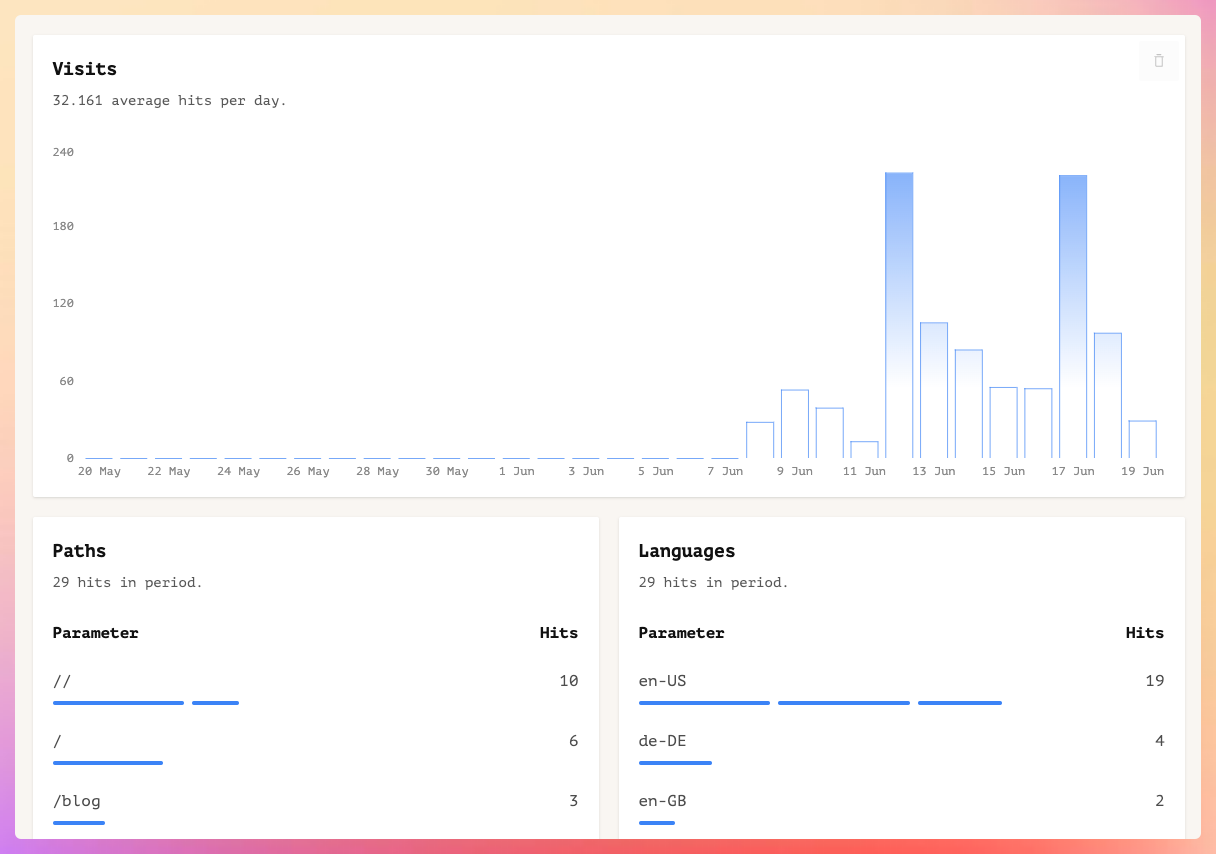
MetricsWave is a Google Analytics alternative that it's fully event-based from it's core. It includes product analytics, funnels, and you can even track every aspect of your business like deploys, sign-ups and whatever your want.
Because it's fully event-based and every product is different you can create as many dashboards as you want so you can track different part of your product.
Depending on your traffic and the amount of events that you are triggering it can be free or not, but it's cheaper than other alternatives out there.
Matomo
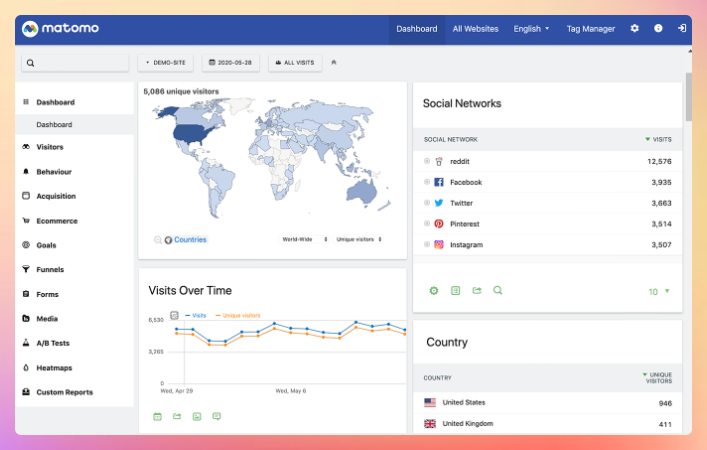
Matomo is a widely accepted alternative to Google Analytics. It's analogous to UA in the sense that it uses a session-based tracking approach, and it even allows for the import of data from a current Google Analytics account.
However, it has some of the same drawbacks as Google Analytics. Although Matomo has included more sophisticated analytics capabilities, it's more suitable for conventional website analytics than for tracking desktop and mobile applications.
Similar to PostHog, it's open-source, meaning that it can be self-hosted if desired.
TelemetryDeck
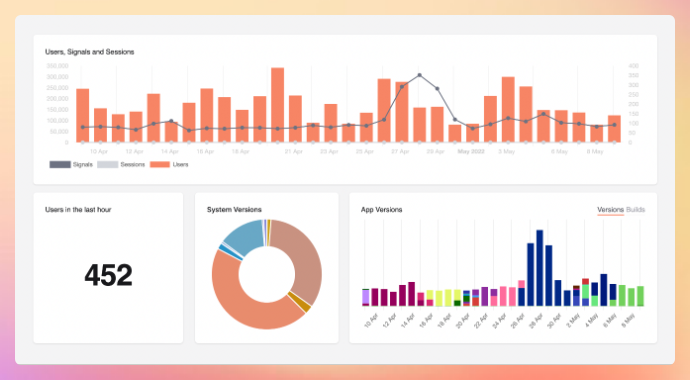
TelemetryDeck is primarly a privacy-oriented analytics solution for mobile applications. It operates on an event-based tracking model, referred to as 'signals'. It has SDKs specifically designed for Swift (iOS, macOS etc.), Kotlin (Android and Java) and Javascript (node and web).
Using TelemetryDeck, app developers can easily keep track of active users, OS version, app version and basic user metadata such as user location. It also provides basic retention and conversion funnel insights. As TelemetryDeck only gathers basic user metadata, there is no need for tracking consent banners.
Although it can be used on websites, TelemetryDeck is mainly intended for mobile apps.
Plausible
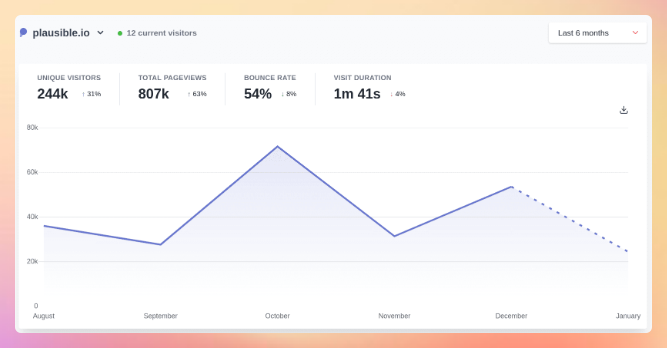
Seemingly, Plausible is a frontrunner in the growth of lightweight, privacy-focused analytics tools. It's user-friendly and doesn't gather any personally identifiable data. This makes it suitable for adhering to GDPR, but this comes with a cost of features.
Plausible, and others of its kind, can merely monitor fundamental website metrics such as pageviews, session duration, and referrer data. This renders it of no use for apps, and considerably less powerful compared to Google Analytics and other options in this list.
Piwik PRO
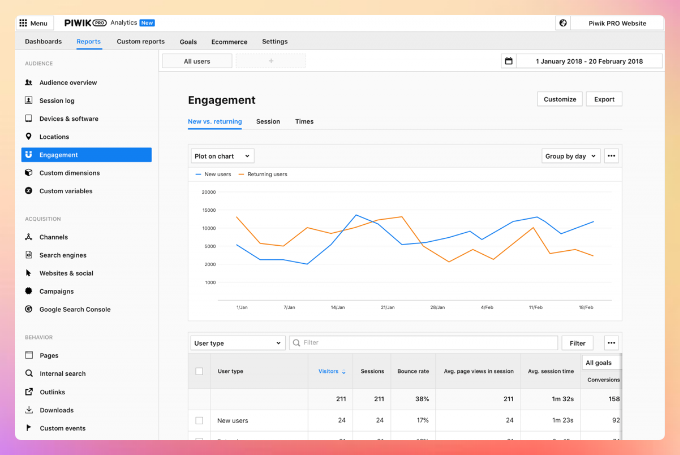
Piwik PRO is a business version of Matomo, which was formerly named Piwik. The two have some common features, such as session-based monitoring and similar user interfaces. The main advantages of Piwik PRO are the enterprise-level support and the integration of a customer data platform (CDP). In addition, it also pays attention to privacy compliance by incorporating a consent manager.
Fathom
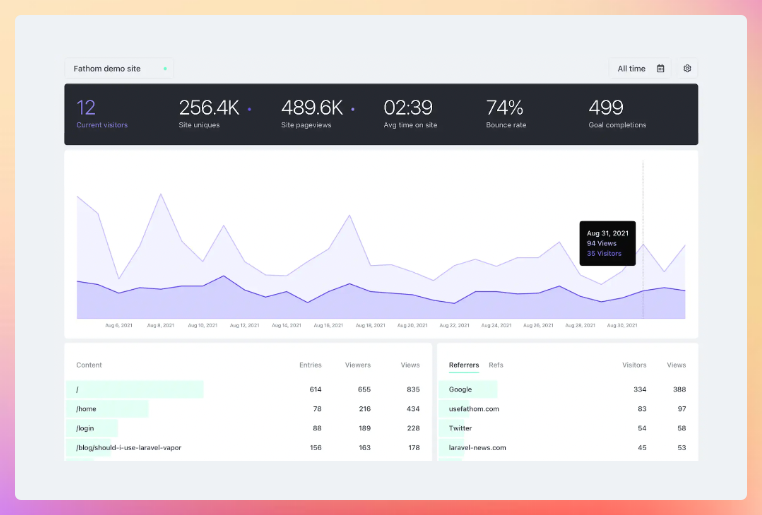
Fathom is a notable privacy-oriented analytics tool that is analogous to Plausible. It is suitable for small and medium-sized marketing websites, however, it does not have the more advanced features that are usually desired by Google Analytics users. At present, it does not have the capability to import GA data, though this is a feature that is in the process of being created.
Others
- PostHog: is a comprehensive Product OS that encompasses product analytics, session recording and A/B testing - basically, everything you need to monitor user behavior in a website or app. Much like GA4, PostHog is an event-based platform and is charged based on the number of events used, although it provides an abundant 1 million events for free each month, thus allowing most minor users to utilize it without cost.
- Counter: is a free and open source analytics solution that operates on a "pay what you want" basis. It is not comparable to GA4 in terms of features, but it is ideal for tracking basic website metrics such as visits, referral data, and user properties (e.g. device, platform, and browser).